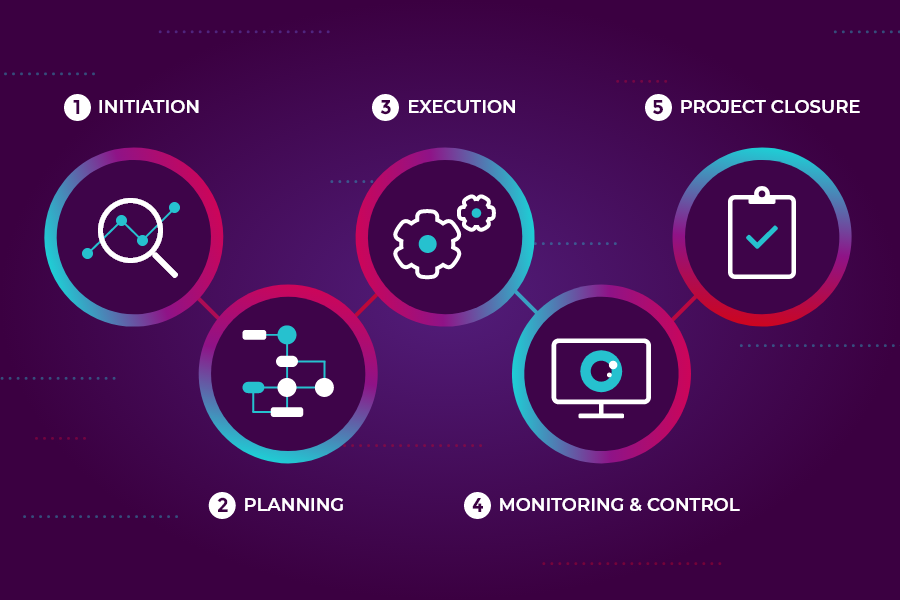
Do these challenges sound familiar in your daily project management?
- Scope creep
- Lack of communication
- Budgeting issues
- Inadequate risk management
- Lack of accountability
If yes, then it's time you revisited the fundamentals of project management and get back on track. Strengthen your project management by using project management tools for software development.
A Guide to the Project Management Book of Knowledge (PMBOK® Guide)
The Project Management Institute (PMI) developed five phases of project management that are laid out well in the book: A Guide to the Project Management Book of Knowledge (PMBOK® Guide). PMBOK’s 7th Edition is set to be released in August 2021.
Read on: Kanban Methodology: How Can It Help Your Software Development?
Plan well for a successful project
The project management process for software development has a few differences compared to other industries. The first rule is not to jump into the development of your software project right away. Preparation and planning are crucial for a successful project. It’s important to be patient and wait for the requirements to be precise and confirmed. You then also have to plan out your development and implementation activities. Resources and budgets need careful planning. Project initiation could involve choosing the right software tools and programs for development and implementation. Compatibility issues with other applications and technologies also have to be analyzed. It involves detailed planning and identifying risks and obstacles.
These are crucial elements that run throughout the project’s lifecycle. Controlling projects systematically and timely can help you, as a PM, see essentials in a phase before moving on to the next one.
The Project Management approach for software development
There are different project management methodologies for software development. Irrespective of the type of methodology you use in your software development project, whether its agile or waterfall, the core concepts of managing projects remain the same.
Many companies today prefer agile project management for software development, yet there are still some that choose traditional methods like waterfall. Ultimately, it’s about measuring whether project management KPIs are showing positive results. Issues and risks must be identified and mitigated in advance.
What are the 5 phases of Project Management?

1. Project Initiation phase
Initiation is about defining the project at a high level. It usually starts with a business case and a feasibility study.
Project stakeholders conduct their analysis and decide whether the project is feasible and can proceed. The business case document justifies the need for the project and states the potential financial benefits. The feasibility study evaluates the project's goals, timelines, costs and helps assess whether it makes sense to proceed. The project then gets assigned to a project team if nothing else is declared unfeasible, shelved, or postponed for a later review.
2. Project Planning phase
Once the project is approved, it enters the planning phase and a project management plan for software development gets initiated. A project plan helps keep the project on time and on budget. Project plans help us to understand the cost, scope, and timeframe of the project. They also help identify obstacles and risks throughout the project.
The planning phase defines the scope and the project management plan. It identifies cost, quality, available resources, and a timetable. It typically involves breaking the work down with a Work Breakdown Schedule (WBS), identifying milestones, and using a visual timeline like a Gantt chart. One will also define communication channels, escalation matrix, and risk management.
3. Project Execution
Project execution is about developing the deliverables per defined milestones and timelines. The project manager allocates work and resources for tasks. The project execution happens as per the project plan which was specified in the earlier phase.
Tasks in the execution phase are as follows:
- Assigning resources to tasks
- Executing project management plans
- Procurement of management assistance if needed
- PM managing project execution
- Set up tracking systems
- Task assignments
- Status meetings
- Update project schedules based on developments
- Modify project plans as needed
The next phase, project monitoring and control, coincides with the project execution phase.
4. Project Monitoring and Control
In the project monitoring phase, KPIs help check if the project is on track. The usual KPIs used include:
- Project objectives: monitors if the project is on schedule and within planned budgets.
- Effort and cost tracking: tracking efforts and costs for the completed milestones and the ones to be done will inform you whether a project will be done in its planned timeline.
- Quality of deliverables: measures if the deliverables are done as per specified quality and need no rework.
- Project performance: monitoring changes in the project and addressing issues and impacts are essential in this stage. These can, in turn, impact the scope, effort, time, and cost. Scope creep and variations in allotted cost and time help monitor project performance.
5. Project Closure
Once project deliverables are completed and deployed successfully, the customer and stakeholder are informed of the project closing. A final project report may be prepared and signed off by stakeholders and will contain recommendations for process improvements for future projects.
Read on: Agile Software Development: Definition, Manifesto, Framework, And Benefits
Is Project Management a mammoth exercise?
People may use any preferable method which they feel is the best project management methodology for software development. Project management may seem like a mammoth exercise when looking at the five stages, but breaking a project into these stages helps manage projects efficiently and ensures time and resources are used optimally in order to make projects successful.
Try Vault for Project Management
Empower your team to use Vault for software project management. The cloud-based SaaS application is user-friendly and will allow your teams to plan projects, monitor, manage, and report on work activities. Improve your team’s efficiency and productivity with real-time project visibility, analytical dashboards, and drill-down reports.
